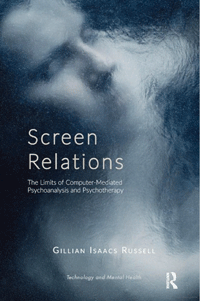The Webinar Committee was pleased to present its most recent program, “Technology-Mediated Psychoanalytic Treatment During the Pandemic,” in July, led by Gillian Isaacs Russell (USA) and co-moderated by Micha Weiss (Israel) and Robert Benedetti (USA). Dr. Russell’s prescient book, Screen Relations: The Limits of Computer-Mediated Psychoanalysis and Psychotherapy (Karnac, 2015) — which she wrote pre-pandemic—served as the background reading for this gathering of over 100 psychoanalytic clinicians from around the world.
This challenging and almost-too-timely webinar explored themes such as: absence, presence, and how screen time is shaping our relational lives; the importance of the body/embodiment in our work; and the ways telepresence is cultivated, to name but a few. Dr. Russell’s work challenged the participants’ relief at having virtual relations serve as a lifeline in pandemic times. While highlighting the losses and limitations involved in online relating, Dr. Russell stressed that awareness of these factors may enhance the efficacy of online therapeutic relating.
Two more webinars are planned for 2020. First, from October 5 to 18 we will feature an Italian-language webinar entitled “Recovering the Future: Experiences of Hope, Fear and Uncertainty in the Analytic Work and Daily Life.” This program will be co-moderated by Carmine Schettini (Italy) and Maria Silvia Soriato (Italy), featuring a group of panelist-authors.
Shortly after our Italian-language program concludes, we will present “The Relational Baby: Implications for Clinical Psychoanalysis” led by Stephen Seligman (USA) and moderated by Christina Emanuel (USA). Running from October 26 to November 8, this program will feature readings from Dr. Seligman’s 2018 book, Relationships in Development: Infancy, Intersubjectivity, and Attachment (Routledge, 2018). Since Freud, each psychoanalytic group has relied on its own “metaphor of the baby” (Mitchell, 1988) to buttress its own core assumptions. In this webinar we will consider the relational psychoanalytic baby, including implications for relational psychoanalytic technique when thinking about the infancy and childhood of our patients.
Looking ahead to 2021, we will begin with a Spanish-language webinar led by Juan Francisco Jordan (Chile), from January 11 to 24. Participants will discuss Dr. Jordan’s 2008 article, “Intersubjetividad: el giro fenomenológico en el psicoanálisis,” published in Revista Chilena de Psicoanalisis. This paper considers the phenomenological turn in psychoanalysis, with an interesting clinical case and implications for clinical practice. The webinar will be co-moderated by Adriana Cuenca (Mexico & USA) and Alejandra Plaza (Mexico).
Other programs are in the works in 2021, including a webinar in collaboration with the Child, Adolescent and Parent Psychotherapy Committee, co-chaired by Ann Marie Sacramone (USA) and Susanna Federici (Italy). Additionally, the Candidates Committee is planning a webinar led by Galit Atlas (USA) to take place February 1 to 21.
We look forward to having you join us for these stimulating online learning opportunities.
Carmine Schettini (Italy) and Christina Emanuel (USA), co-chairs
 Carmine Schettini
Carmine Schettini
Email Carmine Schettini
 Christina Emanuel
Christina Emanuel
Email Christina Emanuel
Il Webinar Committee ha avuto il piacere di presentare nel suo programma più recente: “Il trattamento psicoanalitico mediato dalla tecnologia, nel periodo della pandemia”. Condotto da Gillian Isaacs Russell (USA) e co-moderato da Micha Weiss (Israele) e Robert Benedetti (USA), questo webinar si è svolto dal 13 al 26 Luglio. Il libro lungimirante della dottoressa Russell: “Psicoanalisi attraverso lo schermo: I limiti delle terapie online” (Karnac, 2015) (nella sua traduzione pubblicata in italiano per Astrolabio, 2017 – N.d.T.) – che l’Autrice aveva scritto prima della pandemia – è stato utilizzato come lettura di base nell’incontro con più di 100 partecipanti da tutte le parti del mondo.
Questo stimolante e fin troppo attuale webinar ha esplorato tematiche come: l’assenza, la presenza, e come il tempo dello schermo sta plasmando le nostre vite ralazionali; l’importanza della presenza del corpo nel nostro lavoro; e i modi in cui ci si prende cura della presenza a distanza, giusto per citarne alcuni. La dottoressa Russell ha stimolato e sostenuto i partecipanti nell’uso di relazioni terapeutiche virtuali, come una linfa vitale in tempo di pandemia. Se da una parte l’Autrice ha evidenziato i limiti delle relazioni online, ha anche messo in risalto come la consapevolezza di questi fattori può accrescere l’efficacia delle relazioni terapeutiche online.
Per il 2020 sono previsti ancora due webinar. Il primo che presenteremo, che sarà svolto in lingua italiana, si intitola: “Recuperare il Futuro: Esperienze di Speranza, Paura e Incertezza nel Lavoro Clinico e nella Vita Quotidiana” e sarà moderato da Carmine Schettini (Italia) e da Maria Silvia Soriato (Italia). Un gruppo di Panelist affronterà questa tematica così importante da diverse prospettive.
Una volta concluso il webinar in italiano, presenteremo “Il Bambino Relazionale: Implicazioni per la Clinica Psicoanalitica”, condotto da Stephen Seligman (USA) e moderato da Christina Emanuel (USA). Questo webinar si svolgerà dal 26 Ottobre al 8 Novembre e presenterà alcuni brani dal libro del Dr. Seligman del 2018: “Relationships in Development: Infancy, Intersubjectivity, and Attachment (Routledge, 2018). Da Freud in poi, ogni gruppo psicoanalitico ha contato su una propria “metafora del bambino” (Mitchell, 1988) per sostenere le propie ipotesi di base. In questo webinar prenderemo in considerazione il bambino relazionale, includendo le implicazioni per la tecnica psicoanalitica relazionale quando pensiamo all’infanzia dei nostri pazienti.
Guardando al 2021, cominceremo con un webinar in lingua spagnola condotto da Juan Francisco Jordan (Cile), previsto dal 11 al 24 Gennaio. In questo webinar I partecipanti discuteranno l’articolo del 2008 del Dr. Jordan: “Intersubjetividad: el giro fenomenológico en el psicoanálisis,” pubblicato in Revista Chilena de Psicoanalisis.
Questo lavoro prende in considerazione la svolta fenomenologica in psicoanalisi, con un interessante caso clinico, e le sue implicazioni nella pratica clinica. Questo webinar sarà co-moderato da Adriana Cuenca (Messico e USA) e Alejandra Plaza (Messico).
Sono in corso di programmazione altri webinar per il 2021, incluso un webinar in collaborazione con il Child, Adolescent and Parent Psychotherapy Committee, coordinato da Ann Marie Sacramone (USA) e Susanna Federici (Italia). Inoltre, il Candidates Committee sta organizzando un webinar che si terrà in Febbraio, dal 1 al 21, e sarà condotto da Galit Atlas (USA).
Speriamo proprio di avervi con noi in queste opportunità di apprendimento online molto stimolanti per la nostra comunità internazionale.
Carmine Schettini (Italia) e Christina Emanuel (USA)



